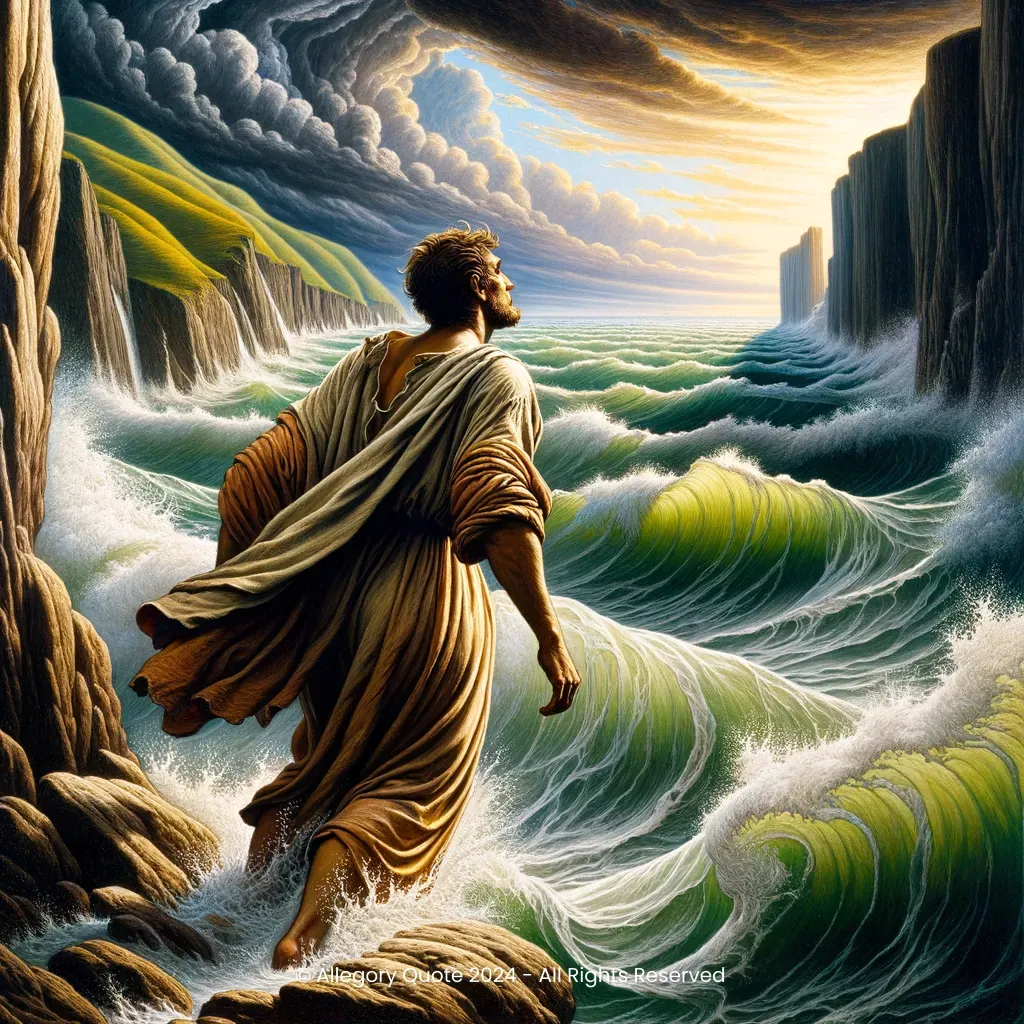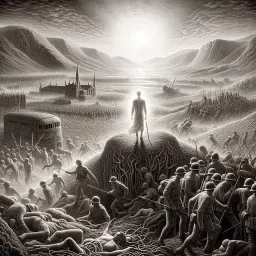”And just as someone who,
with laboring breath, has escaped the sea to reach the shore,
turns back to gaze at the perilous waters“

- Meaning
- The phrase describes a man who, after struggling against the waves of a dangerous sea and reaching the shore, turns back to look at the treacherous waters he has just overcome. This image symbolizes Dante's own state of mind, who, after facing a spiritual and moral crisis, finds himself temporarily safe and reflects on the difficulties he has just surpassed. The perilous waters represent the trials and sufferings of life, and the act of turning back serves as a reminder of how overcoming such challenges can provide a new perspective on life.
- Allegory
- The image should include a tumultuous and perilous sea with high, threatening waves, representing life's difficulties and adversities. A pilgrim, symbolized by Dante, should be emerging and standing on the safe shore, indicating salvation and redemption. The act of looking back represents reflection on the surmounted hardships. The serene landscape and the sky opening to calmness symbolize hope, rebirth, and new awareness. The use of strong, contrasting colors serves to emphasize the difference between difficulties and salvation, inducing a feeling of relief and gratitude.
- Applicability
- The meaning of this phrase can be applied to personal life as an invitation to reflect on the hardships overcome and to recognize the strength and courage demonstrated in doing so. It is a chance to appreciate the journey taken and to prepare for new challenges with greater awareness and determination. It expresses the idea that, despite adversities, there is always the possibility of finding salvation and taking a moment to reflect and learn from lived experiences.
- Impact
- "The Divine Comedy" and its quotations have had a tremendous impact on Western culture, literature, and philosophy. This specific passage reflects a universal theme of struggle and redemption that has resonated with many generations of readers. Dante's work has inspired countless artists, writers, and thinkers, influencing works of art, literature, and philosophical thought for centuries. Often quoted and studied, "The Divine Comedy" continues to be a source of deep inspiration and reflection.
- Historical Context
- "The Divine Comedy" was written between 1308 and 1320. The historical context is medieval Italy, a period characterized by political tensions, factional battles, and profound cultural and social changes. Dante himself lived in exile for a significant part of his life, making his work and its themes deeply personal and political. The quotation reflects both Dante's internal turmoil and the difficulties of the surrounding world.
- Criticisms
- There have not been significant controversies related to this specific passage of "The Divine Comedy." However, Dante's overall work has been subject to divergent interpretations and critical debates, especially regarding his approach to politics, theology, and morality. Generally, the themes of struggle and redemption have been commonly accepted and appreciated.
- Variations
- There are many variations and interpretations of the themes treated by Dante in "The Divine Comedy" across different cultures. In Greek mythology, the concept of a perilous journey and reflection can be seen in Homer's Odyssey, where Odysseus faces innumerable difficulties before returning home and reflecting on his adventures. In other cultures, such as Eastern ones, the theme of redemption and overcoming difficulties can be found in the stories of Buddha and his path to enlightenment.
-

In the midst of chaos, there is also opportunity.
-

Love, which absolves no loved one from loving, seized me so strongly with his charm that, as you see, it does not leave me even now.
-

You never know how strong you are, until being strong is your only choice.
-

Our long national nightmare is over.
-

Ah, how hard it is to describe this rough and harsh and dense forest, which renews fear in my thoughts!
-

Your will is free, upright, and whole; henceforth, you act according to its discretion. Therefore, I crown and mitre you over yourself.
-

O imagination, that sometimes steals us so, from outside things, that we pay no attention, though someone might be present who hears a bell or a horn, within you!
-

Infinite goodness has such wide arms, that it embraces all that turns to it.
No Comments